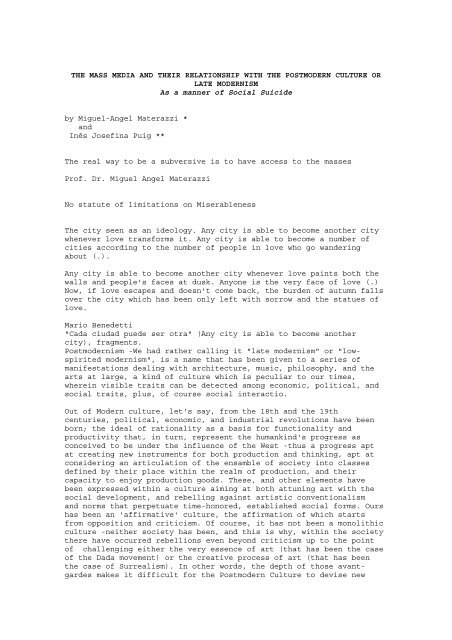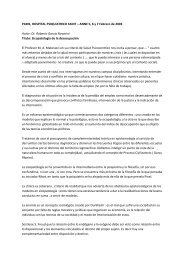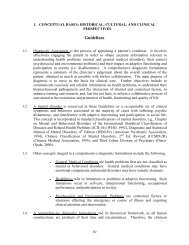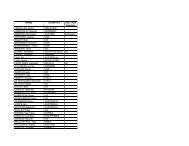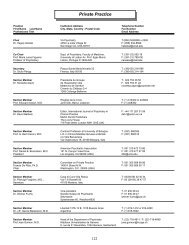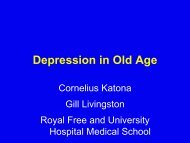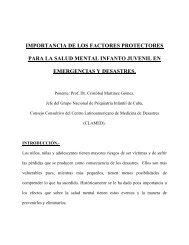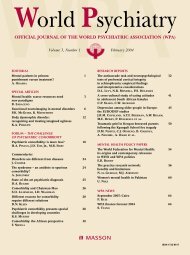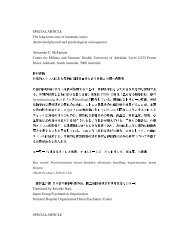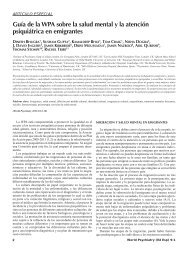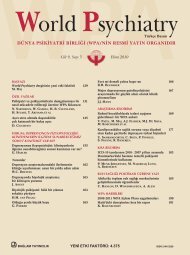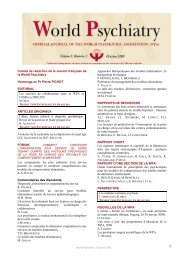the mass media and their relationship with the postmodern culture
the mass media and their relationship with the postmodern culture
the mass media and their relationship with the postmodern culture
Create successful ePaper yourself
Turn your PDF publications into a flip-book with our unique Google optimized e-Paper software.
THE MASS MEDIA AND THEIR RELATIONSHIP WITH THE POSTMODERN CULTURE ORLATE MODERNISMAs a manner of Social Suicideby Miguel-Angel Materazzi *<strong>and</strong>Inés Josefina Puig **The real way to be a subversive is to have access to <strong>the</strong> <strong>mass</strong>esProf. Dr. Miguel Angel MaterazziNo statute of limitations on MiserablenessThe city seen as an ideology. Any city is able to become ano<strong>the</strong>r citywhenever love transforms it. Any city is able to become a number ofcities according to <strong>the</strong> number of people in love who go w<strong>and</strong>eringabout (.).Any city is able to become ano<strong>the</strong>r city whenever love paints both <strong>the</strong>walls <strong>and</strong> people's faces at dusk. Anyone is <strong>the</strong> very face of love (.)Now, if love escapes <strong>and</strong> doesn't come back, <strong>the</strong> burden of autumn fallsover <strong>the</strong> city which has been only left <strong>with</strong> sorrow <strong>and</strong> <strong>the</strong> statues oflove.Mario Benedetti"Cada ciudad puede ser otra" (Any city is able to become ano<strong>the</strong>rcity), fragments.Postmodernism -We had ra<strong>the</strong>r calling it "late modernism" or "lowspiritedmodernism", is a name that has been given to a series ofmanifestations dealing <strong>with</strong> architecture, music, philosophy, <strong>and</strong> <strong>the</strong>arts at large, a kind of <strong>culture</strong> which is peculiar to our times,wherein visible traits can be detected among economic, political, <strong>and</strong>social traits, plus, of course social interactio.Out of Modern <strong>culture</strong>, let's say, from <strong>the</strong> 18th <strong>and</strong> <strong>the</strong> 19thcenturies, political, economic, <strong>and</strong> industrial revolutions have beenborn; <strong>the</strong> ideal of rationality as a basis for functionality <strong>and</strong>productivity that, in turn, represent <strong>the</strong> humankind's progress asconceived to be under <strong>the</strong> influence of <strong>the</strong> West -thus a progress aptat creating new instruments for both production <strong>and</strong> thinking, apt atconsidering an articulation of <strong>the</strong> ensamble of society into classesdefined by <strong>the</strong>ir place <strong>with</strong>in <strong>the</strong> realm of production, <strong>and</strong> <strong>the</strong>ircapacity to enjoy production goods. These, <strong>and</strong> o<strong>the</strong>r elements havebeen expressed <strong>with</strong>in a <strong>culture</strong> aiming at both attuning art <strong>with</strong> <strong>the</strong>social development, <strong>and</strong> rebelling against artistic conventionalism<strong>and</strong> norms that perpetuate time-honored, established social forms. Ourshas been an 'affirmative' <strong>culture</strong>, <strong>the</strong> affirmation of which startsfrom opposition <strong>and</strong> criticism. Of course, it has not been a monolithic<strong>culture</strong> -nei<strong>the</strong>r society has been, <strong>and</strong> this is why, <strong>with</strong>in <strong>the</strong> society<strong>the</strong>re have occurred rebellions even beyond criticism up to <strong>the</strong> pointof challenging ei<strong>the</strong>r <strong>the</strong> very essence of art (that has been <strong>the</strong> caseof <strong>the</strong> Dada movement) or <strong>the</strong> creative process of art (that has been<strong>the</strong> case of Surrealism). In o<strong>the</strong>r words, <strong>the</strong> depth of those avantgardesmakes it difficult for <strong>the</strong> Postmodern Culture to devise new
ebellious postures that, up to date, have not been in a position toreach <strong>the</strong> high grade of radicalization of Modernism.Perhaps <strong>the</strong> hallmark of this time has been to take care of technocracy(in one h<strong>and</strong> ), against <strong>the</strong> development of warmer <strong>and</strong> more stablishedhuman being <strong>relationship</strong>s ( in <strong>the</strong> o<strong>the</strong>r h<strong>and</strong> ).So we can see <strong>the</strong>following paradox : young people (childs <strong>and</strong> adolescents ) who becamespecialists in to disguise <strong>the</strong>ir deepest feelings <strong>and</strong> , particulary,<strong>the</strong>ir empty feelings. They, often commite suicide attempts in <strong>the</strong>frame of a disfunctional family <strong>with</strong> emotionally aloof <strong>and</strong> distantnarcissistic bonds (many times in narcissistic <strong>and</strong> histrionicpersonality disorders ).But, those families may pay, frequently,expensive <strong>and</strong> sofisticated treatments of medical carefulness <strong>and</strong>rehabilitation.Thus, when those young people come back to <strong>the</strong>ir home,find again a "nest" <strong>with</strong>out cre <strong>and</strong> warm. So <strong>the</strong>y must face<strong>the</strong>ir empty feelings <strong>and</strong> to seek o<strong>the</strong>r "partners" like <strong>the</strong> Media , forexample. Many times <strong>the</strong>y meet in TV series or movies <strong>the</strong> pssibilityof an identification <strong>with</strong> <strong>postmodern</strong> adolescents character ( like<strong>the</strong>mselves ) who indirectly " invite " to steal something or to cut<strong>the</strong>ir necks or wrists. This behavior is "teaching", let us say, everymorning or afternoon. The characters say how to do it <strong>and</strong> what kind of"tool" could be used.In a TV movy about a group of young women very fond of magic, one of<strong>the</strong>m manifestated her intention to buy a book about " white magic ",but also comunicate to her partners <strong>the</strong> impossibility of do it forlack of money. A group mate told her : " ¡It doesn ·t matter. We havefive fingers disscount!", ( in allusion of a stealing ), <strong>and</strong> lateradded : " All <strong>the</strong> humanity <strong>and</strong> even <strong>the</strong> animals do it ! ".Thisexample, show us how , consciously or unconsciously, <strong>the</strong> Post ModernSociety try to teach a suicide of itself. In <strong>the</strong> following paragraphswe will intend to reflect <strong>and</strong> to think about this idea <strong>and</strong> <strong>the</strong> sourceswho inspired this paper.After WWII, different authors told us that a new type of society hadarisen, <strong>and</strong>, according to <strong>the</strong>m, this new type has been called postindustrialsociety, consumerism society, multinational capitalism,neocapitalism, wild capitalism, <strong>mass</strong><strong>media</strong>-driven society, <strong>and</strong> so on.Names that, indeed, point out to a characteristic differing from <strong>the</strong>characteristic <strong>the</strong> former period was endowed <strong>with</strong>. Currently, socialclasses as <strong>the</strong>y had been devised by <strong>the</strong> industrial society are nolonger valid. Conflicts do not arise among classes any longer, <strong>the</strong>yarise between people <strong>and</strong> <strong>the</strong> establishment -i.e. huge organiztionswherein power does not depend of any social class but is exerted bygovernments <strong>and</strong> bureaucracy. This implies a fragmentation of <strong>the</strong>action that, before, was amalgamated into social classes -hence, wecannot talk about exploitation any longer, we have to mention analignment, a consequence of a super-adaptation to <strong>the</strong> system through amanipulation of <strong>the</strong> Mass<strong>media</strong> Culture that controls <strong>the</strong> "apparatus"..We could say that this new order brings about <strong>the</strong> demise of <strong>the</strong><strong>culture</strong> monopoly caused by <strong>the</strong> major countries of <strong>the</strong> western world.This, coupled to <strong>the</strong> arising of <strong>the</strong> <strong>culture</strong> of countries pertaining to<strong>the</strong> so-called Third World that had been damaged by <strong>the</strong> European model<strong>and</strong> <strong>the</strong> arising of <strong>the</strong> so-called sub-<strong>culture</strong>s thanks to antiestablishmentmovements. That is, progress based on science <strong>and</strong>technique is suffering a deep crisis. followed by a simultaneouscrisissuffered by several elements pertaining to <strong>the</strong> Culture of Modernism,namely: <strong>the</strong> cultural unity (as regards <strong>the</strong> universal values of itsproposals, <strong>the</strong> authority of scientific rationality -i.e. <strong>the</strong>
intrinsical goodness of technology, <strong>the</strong> rational foundation of anyaes<strong>the</strong>tic model. All this leads to a de-categorization, so to speak;that is, being prone to a fragmentation against <strong>the</strong> cultural patternsuniversalization promoted by <strong>the</strong> <strong>mass</strong> <strong>media</strong> while evidencing a pseudogoodnessthat manipulates us.Marshall McLuhan, in his book Underst<strong>and</strong>ing Media: The Extension ofMan, proposes a great many statements -<strong>the</strong>re is one, however, that Iconsider to be fundamental: <strong>the</strong> message is <strong>the</strong> mean -that is, from myown perspective, this statement induces us to think that reality isboth positive <strong>and</strong> human, <strong>and</strong> that all <strong>the</strong> "setting" surrounding uslends some tonality to life.Anyhow, I would like to clarify that, even though I have a deeprespect for this author I disagree <strong>with</strong> him at times. Now, if wefollow a research conducted by Oscar Masotta about a correlationbetween <strong>the</strong> <strong>mass</strong> <strong>media</strong> <strong>and</strong> <strong>the</strong> artistic activity we can observe somepoints: for one thing, worldwide, <strong>the</strong> manufacture of TV sets, since<strong>the</strong>ir <strong>mass</strong> irruption in 1948, has reached astronomical figures. Now,let's consider <strong>the</strong> style of two creators, Ranschenberg <strong>and</strong> Tinguely(in <strong>the</strong> 50s <strong>and</strong> early 60s), a style called super-realism thatincorporates what we could call a market-oriented super communicationor <strong>the</strong> over saturation of consumerism <strong>and</strong>, from a certain point ofview denounces <strong>the</strong> underlying authoritarianism by alerting usagainst it. If we follow this trend of thought, we could reach <strong>the</strong>camp works of art: <strong>the</strong>y have to do <strong>with</strong> a naïve style endowed <strong>with</strong> acertain caricature of Romanticism due to a constant inversion ofvalues, <strong>the</strong> conversion of bad taste into good taste, a style thatmakes fun of everything serious, <strong>with</strong> a touch of a somewhat decayedinnocence, <strong>and</strong> a ra<strong>the</strong>r frivolous judgment. In o<strong>the</strong>r words, we caninfer that this "new aes<strong>the</strong>tic object" is bound to constitute a new<strong>and</strong> original message on <strong>the</strong> one h<strong>and</strong> as well as allowing an inspectionto be performed about <strong>the</strong> conditions ruling <strong>the</strong> way any message isconstituted, on <strong>the</strong> o<strong>the</strong>r h<strong>and</strong>.Whenever we deal <strong>with</strong> <strong>the</strong> <strong>mass</strong> <strong>media</strong>, <strong>and</strong> <strong>the</strong> <strong>mass</strong> <strong>media</strong> entourage itis like trying to ei<strong>the</strong>r work <strong>with</strong> music, computing, poetry oroperating <strong>with</strong>in criticism itself by means of informatic models. AsUmberto Eco would say "both <strong>the</strong> notions about <strong>the</strong> number ofinformation, <strong>and</strong> antropy become inseparable".So, we must have a critical posture, we must analyze contents, analyze<strong>the</strong> idea that, <strong>with</strong>in any communication-related situation not only <strong>the</strong>visible contents are simply forwarded but also it should be noted thatthose contents are "articulated" -that is, <strong>the</strong>y form part ofstructures that are unlikely to be visibleNow, if <strong>the</strong> communication process is something else than simplytransmissing <strong>the</strong> signifié of concepts, this is because <strong>the</strong>re exists anefficacious "size" of <strong>the</strong> signifier inasmuch as <strong>the</strong> message forwardingprocesses include ei<strong>the</strong>r a fundamental sense, that is <strong>the</strong> messageproper, or a sign devoid of a specific material substrate because thissubstrate reacts upon both <strong>the</strong> very concept <strong>and</strong> outside <strong>the</strong> concept aswell -<strong>and</strong> this is why that substrate is efficacious <strong>with</strong> regard tobehavior.As Oscar Massotta put it: "Grasping any message could become adifferential process <strong>with</strong> regard to <strong>the</strong> qualitative characteristics of<strong>the</strong> channel involved, <strong>and</strong> <strong>the</strong> appearance of any new medium could causea progress or a change in <strong>the</strong> discrimination grade of differences".Anibal Ford states that refraining from confusing <strong>the</strong> study of <strong>the</strong>
<strong>media</strong> <strong>with</strong> an eulogy for <strong>the</strong> <strong>media</strong> is important. Or criticize <strong>with</strong>outany knowledge about <strong>the</strong> <strong>media</strong> <strong>and</strong> <strong>the</strong>ir <strong>relationship</strong> <strong>with</strong> people isalso important.So, it is also important to take into account both a social<strong>mass</strong><strong>media</strong>tization, as well as an alternative-oriented opposition tothis, in order to avoid that studies on <strong>mass</strong> <strong>media</strong> do not dodge<strong>culture</strong> <strong>and</strong> communication policies -because that would be a "nice"way for not exploring here <strong>the</strong> social injustice comes from.It should be taken into account that <strong>the</strong> ups <strong>and</strong> downs we can observein <strong>the</strong> constitution of <strong>the</strong> <strong>culture</strong>-communication-plus-<strong>media</strong> realm arereal strong when it comes to production while, however, <strong>the</strong>y are weakas far as <strong>the</strong>ir epistemological foundations are concerned -acharacteristic, at that, of <strong>the</strong> so-called transversal knowledge, <strong>and</strong>this we say <strong>with</strong>out falling into <strong>the</strong> <strong>postmodern</strong> skepticism.Peirce speaks about: a) <strong>the</strong> indicial, that is <strong>the</strong> realm of body <strong>and</strong>contiguity, <strong>and</strong>: b) <strong>the</strong> educational, that is <strong>the</strong> realm of conjecture<strong>and</strong> hypo<strong>the</strong>sis, a non-deductive <strong>and</strong> non-inductive territory. Both areimportant for studying <strong>the</strong> <strong>media</strong>.In a connected consideration, M. McLuhan says that our currentelectronic times <strong>with</strong> <strong>the</strong>ir unavoidable evocation of simultaneitypresents a first, serious threat to <strong>the</strong> 2,500-year long predominanceof <strong>the</strong> left hemisphere.Thus, we should not be surprised when we seethat students whose right hemisphere has been TV-educated for 18 yearsface problems when dealing <strong>the</strong> <strong>the</strong> left hemisphere-conceived schoolprograms.Indeed, <strong>with</strong>in <strong>the</strong> current strings of dislexia <strong>and</strong> o<strong>the</strong>r <strong>culture</strong>linkeddifficulties, 90% of victims are men. These problems are adirect result from <strong>the</strong> pressure that not only TV but also o<strong>the</strong>relectronic <strong>media</strong> exert on us <strong>with</strong> <strong>the</strong> idea that we come back to <strong>the</strong>right hemisphere.Kerckhov points out that <strong>the</strong> virtual image accepts a point of view butthis is not a once-<strong>and</strong>-for-all process or, in o<strong>the</strong>r words, an imagebecoming a stable <strong>and</strong> reliable reference. The image of <strong>the</strong> body thatei<strong>the</strong>r an interactive screen or a virtual mirror reflect is not <strong>the</strong>image of a unique being. It is <strong>the</strong> image of an open , protean,tentacular net people go through.F. Roustang states that, as can beexpected, Lévi-Strauss, as an anthropologists, stays <strong>with</strong>in <strong>the</strong> social<strong>and</strong> collective field. Lévi-Strauss, however, opens <strong>the</strong> way that Lacanwill take in <strong>the</strong> future, when he says that, as this is <strong>the</strong> case <strong>with</strong>language, <strong>the</strong> social field is an autonomous reality; symbols are morereal than <strong>the</strong> things <strong>the</strong>y symbolize. The signifier both precedes <strong>and</strong>determines <strong>the</strong> signifié. So, Lévi-Strauss establishes <strong>the</strong> autonomy ofa concept that, in <strong>the</strong> future, Lacan will name "<strong>the</strong> symbolic".Thereafter, Lévi-Strauss will resort to <strong>the</strong> structural linguistics toput in ma<strong>the</strong>matical terms <strong>the</strong> unconscious mental structures that canreached at through institutions or, better, by means of <strong>the</strong> language.Thus, it would be sufficient to replace "institutions" by both Oedipus<strong>and</strong> <strong>the</strong> law. Thanks to such a way of expressing ma<strong>the</strong>maticallylanguage aspects which reveal <strong>the</strong> unconscious, Lévi-Strauss considersthat excluding everything pertaining to feelings, desires, <strong>and</strong>believes is possible. Psychoanalysis allows <strong>the</strong> same -i.e. gettingmore involved <strong>with</strong> all that enhances affects, imagination, that whichhas been lived, <strong>the</strong> unspeakable, <strong>the</strong> unfathomable.
Such a perfect construction, however, is only able to st<strong>and</strong> upprovided <strong>the</strong> identity of two irreconcilable definitions is maintained:on <strong>the</strong> one h<strong>and</strong>, <strong>the</strong> symbolic -facts that create exchanges <strong>and</strong> arelinked to <strong>the</strong> significant language. On <strong>the</strong> o<strong>the</strong>r h<strong>and</strong>, <strong>the</strong> definitionreferred to <strong>the</strong> algebraic sign that, by definition, cannot <strong>and</strong> mustnot mean anything.Lévi-Strauss tells us that <strong>the</strong>re exists a "floating signifier", thatis an excess signifier that has still not been used to signify, towhich a symbolic value zero will be attributed, as a pure symbol, thusapt at acquiring any symbolic content.Life -I should say people <strong>and</strong> paths, have sustained me, giving me <strong>the</strong>possibility to envision reality in an operative way, <strong>and</strong> not a destructuredway.So, in my analysis I will start from <strong>the</strong> invention capacity, <strong>the</strong>"micro-aspects", <strong>the</strong> marginal aspects, through what could be called an"explored drive" -in o<strong>the</strong>r words, an inventive capacity to articulatecommunication, <strong>culture</strong>, <strong>and</strong> <strong>the</strong> <strong>mass</strong> <strong>media</strong>.It is ra<strong>the</strong>r easy to watch how <strong>the</strong> social injustice, violence, <strong>and</strong> <strong>the</strong>destructuration of institutions appear suddenly through <strong>the</strong> multipleimages that A. Ford calls "<strong>the</strong> TV tribe" -as well as <strong>the</strong> market ofloneliness. As already pointed out, <strong>the</strong> field of articulation isstrong as far as production is concerned but weak as far as itsepistemological foundations are concerned, a feature to be found inany transversal knowledge.We have to read <strong>the</strong> history of social transformations from <strong>the</strong>people's level, <strong>and</strong> not at <strong>the</strong> heroes' level -I insist: let us notresort to ei<strong>the</strong>r nostalgy-tinged responses or <strong>the</strong> low-spiritedmodernism's skepticism, <strong>and</strong> let us avoid <strong>the</strong> possibility of beingabsorbed by economy-based forecasts. Instead, let us resort totransversal, transdisciplinary strategies.The distinguished neuropsychologist <strong>and</strong> psycholinguist Oliver Sackscasts some light over <strong>the</strong> "postscriptural" writing in a short story<strong>the</strong> title of which has been translated in Spanish as "The man whoconfused his wife <strong>with</strong> a hat"(1987). His main character, Dr. P. onlyexpresses himself by means of formal gnosis -i.e. <strong>the</strong> capacity to <strong>the</strong>abstract; he never resorts to concrete gnosis -i.e. <strong>the</strong> capacity torecognize someone's face. Dr. P constructs his world as if it were asoftware, by means of distinct <strong>and</strong> computer-like schemes features -thus, it would seem that cognitive sciences suffer from a similaragnosia. So, in an apparently naïve way, he will impugn <strong>the</strong>displacement <strong>the</strong> scientific knowledge produces over feelings,continuous judgment, <strong>the</strong> personal, <strong>the</strong> particular, <strong>the</strong> concrete, <strong>the</strong>real. Sacks criticizes (not in an Hegelian way) <strong>the</strong> concept of <strong>the</strong>concrete as something primitive, as something that has to beelevated, through <strong>the</strong> writing, to abstraction <strong>and</strong> generalization.Conversely, Lévi-Strauss considers that science is an ascent to <strong>the</strong>concrete.We have already seen that Peirce deals <strong>with</strong> <strong>the</strong> indicial -that is <strong>the</strong>realm of <strong>the</strong> physical <strong>and</strong> <strong>the</strong> contiguous, <strong>and</strong> deals <strong>with</strong> abduction -that is, <strong>the</strong> realm of conjectures <strong>and</strong> hypo<strong>the</strong>sis.
clashing between our own <strong>culture</strong>s, <strong>and</strong> among our <strong>culture</strong>s <strong>and</strong> <strong>the</strong>First World <strong>and</strong>/or certain aspects of <strong>the</strong> East to be found inarticles manufactures in South Eastern Asia that are so widelysold on <strong>the</strong> poor Latin American markets.In o<strong>the</strong>r words, this is a non-homogeneous globalization. It is muchcloser to <strong>the</strong> cultural promiscuity that was found in <strong>the</strong> BuenosAires, end-of-XIX-century tenements (conventillos), than closer to<strong>the</strong> Victorian asepsis that was devoted to funcionality <strong>and</strong> <strong>the</strong>homeostatis that, ideally speaking, underline McLuhan's "village" -aspects that are also found in <strong>the</strong> ways that many "communicationlinkedutopias" try to solve social conflicts starting from systemsthat "formalize" communication. However, communication systems areunlikely to solve <strong>the</strong> problems affecting this world of ours wheresymbols are more than enough but too little food.We need frames of reference for a general reasoning to explain ourpeculiar global society, however our <strong>culture</strong>s are exceeding<strong>the</strong>mselves in <strong>the</strong> observation of <strong>the</strong> particular , <strong>and</strong> <strong>the</strong> privateaspects of <strong>the</strong> "case" at stake that is now always ei<strong>the</strong>r framed orgeneralized as it should be. The crisis of <strong>the</strong> macro systems -well,<strong>the</strong> crisis of explanations <strong>the</strong>reof takes <strong>the</strong> case to narrativeaspects, it not only implies a greater ethic dem<strong>and</strong> about itsutilization but also it means avoiding that <strong>the</strong> case becomes analibi to conceal <strong>the</strong> structures <strong>and</strong> networks of power.Communication, information, <strong>and</strong> <strong>the</strong> <strong>mass</strong> <strong>media</strong> are going to play acentral role when it comes to covering <strong>the</strong> needs of local types ofknowledge as far as territory <strong>and</strong> symbol are concerned, <strong>with</strong>out decontextualizethose types of knowledge from <strong>the</strong> globalizationprocesses. Society possesses o<strong>the</strong>r communication <strong>and</strong> informationnetworks as well as networks dealing <strong>with</strong> <strong>the</strong> construction of meaning-in o<strong>the</strong>r words, society keeps establishing <strong>the</strong> difference betweenfact <strong>and</strong> symbol.There exists a crisis of o<strong>the</strong>rness. Something goes wrong wheneverviolence appears instead of communication.The development of technologies increases <strong>the</strong> possibility forloneliness -loneliness becomes possible whenever it is accompanied, orcompensated by an imaginary, illusory <strong>relationship</strong>: fiction.Each time you get much more used to <strong>the</strong> illusion of being submerged<strong>with</strong>in <strong>the</strong> world. as a result, <strong>the</strong> <strong>relationship</strong>s <strong>with</strong> people get more<strong>and</strong> more difficult.Should be cast a glance at <strong>the</strong> production of thinkers <strong>and</strong> writers from<strong>the</strong> 20th century modernity, <strong>and</strong> compare it to <strong>the</strong> production ofthinkers <strong>and</strong> writers from <strong>the</strong> 19th century we find that perspectivehas been radic ally flattened, <strong>and</strong> <strong>the</strong> field of imagination has beenreduced. The 19th century thinkers were, at <strong>the</strong> same times, friends<strong>and</strong> foes of modern life, <strong>the</strong>y struggled tirelessly h<strong>and</strong> to h<strong>and</strong>against <strong>the</strong> many ambiguities <strong>and</strong> contradictions of modernity. Themain source for <strong>the</strong>ir creative capacity could be found into <strong>the</strong>irinner strain, <strong>and</strong> <strong>the</strong>ir being ironical toward <strong>the</strong>mselves proper.Their 20th successors have preferently oriented <strong>the</strong>mselves towardrigid polarizations <strong>and</strong> rough totalizations. Modernity isaccepted <strong>with</strong> a "neo-olympian" estrangement <strong>and</strong> disdain: it isconsidered as a closed, monolithic structure unlikely to be shaped orchanged by modern humans. It should be noted that <strong>the</strong> fundamental
polarizations have occurred at <strong>the</strong> very beginning of <strong>the</strong> 20thcentury.Any future adaptations will dem<strong>and</strong>, so to speak, wide social <strong>and</strong>political turmoils inasmuch as <strong>the</strong> modernization of <strong>the</strong> futureadaptations always thrives <strong>with</strong>in conflicts, <strong>with</strong>in an atmosphere of"uncertainty <strong>and</strong> permanent agitation". Within such atmosphere, <strong>the</strong><strong>culture</strong> of <strong>the</strong> late modernism, or low-spirited modernism will keepdeveloping new visions <strong>and</strong> expressions <strong>with</strong> regard to life since <strong>the</strong>very economic <strong>and</strong> social impulses that, tirelessly, transform oursurrounding world -for good or not, will also transform <strong>the</strong> innerlife of people who live in, <strong>and</strong> keep it moving.Let us recall Marvin Minsky when he extolled a future physiologicalreconstruction, saying that[1] "this means that [people] will have<strong>with</strong>in <strong>the</strong>ir skulls all <strong>the</strong> space <strong>the</strong>y may need to implant additionalsystems <strong>and</strong> memories. So, little by little, we will be in a positionto learn more, year in year out, to add new types of perception, newways of reasoning, new thinking or imaging habits".So, <strong>the</strong> mega-design of neurosciences is no longer limited to <strong>the</strong>shaping of ei<strong>the</strong>r <strong>the</strong> structure or <strong>the</strong> infrastructure of anindustrial "object" -instead it regenerates <strong>the</strong> impulses of <strong>the</strong>neurotransmitters of a live "subject", so that a king of cognitiveergonomy be set up,<strong>the</strong> last type of neuroleptic connection that couldbe called <strong>the</strong> infrastructure of behavior.Converting, so to speak, <strong>the</strong> body <strong>and</strong> its vital energy, in acontemporary of <strong>the</strong> era of <strong>the</strong> teletechnology of instant transmissionis, at <strong>the</strong> same time, abolishing <strong>the</strong> classical distinction between<strong>the</strong> inner <strong>and</strong> <strong>the</strong> outer realms in favor of a "most modern" type ofcentrality. well, we could call it a hyper-centrality, <strong>the</strong> hypercentralityof a "present" time (not to say an "actual" time) thatreplaces definitively <strong>the</strong> difference between periphery <strong>and</strong> center.Until some time ago, to be present meant to be near (or next to)ano<strong>the</strong>r person, physically, through our look, our voice, our beingable to touch his or her body. Now <strong>the</strong> <strong>mass</strong><strong>media</strong> proximity, based onelectromagnetic waves, discredit <strong>the</strong> value of nearness.Instead of acting, we -sorry for <strong>the</strong> neologism, "teleact", that is wesee, listen to, speak, <strong>and</strong> imagine that we touch or even feel at adistance, a nice way to alter our propioception wherein <strong>the</strong> essencialnotion of being <strong>and</strong> acting, here <strong>and</strong> now, losses every possiblemeaning.Let us also recall Nietsche when (in Zarathustra) he presents a model"to underst<strong>and</strong> this type of person: in principle you have to realizewhat is his or her first physiological condition that is what I call<strong>the</strong> Great Health. We new men or no-named man, difficult to convince,that have been born too early for a future <strong>the</strong> demonstration of whichhas not been done yet, we need a new aim, a new means <strong>and</strong> I refer to anew health: more vigorous, more acute, more long-lasting, more daring,<strong>and</strong> more joyful than all classes of health have been up to now".According to this philosopher: "A Great Health will be necessary, ahealth that you possess but that you have to conquer time <strong>and</strong> timeagain because you have to sacrifice it. Supermen are dangerouslyneeded whose compensation should be an unknown country <strong>the</strong> borders ofwhich nobody has seen until now, a far away l<strong>and</strong> fur<strong>the</strong>r than allpossible countries".
o<strong>the</strong>r words, <strong>the</strong> fundamental principle of science is: we cannotdemonstrate that anything is true -never. All we can prove is thatsomething is false.It is Francis Fukuyama's contention that, in <strong>the</strong> contemporary world,all <strong>culture</strong>s tend to come toge<strong>the</strong>r into <strong>the</strong> ideal of capitalism <strong>and</strong>liberal democracy, by giving momentum to socially diverse communitiesfor <strong>the</strong>m to head towards <strong>the</strong> creation of liberal, capitalistdemocracies as <strong>the</strong> last stage of <strong>the</strong> historical process. F.F.'sexpansionist ideology goes <strong>the</strong> same way as globalization <strong>with</strong> a markettotalitarian vocation.What Samuel Huntington calls <strong>the</strong> clash of civilizations is <strong>the</strong>contrary to <strong>the</strong> end of Fukumaya's end of history: S.H.'s is a call fora stoical resignation inasmuch as we cannot cause <strong>the</strong> planet to becomea Wall Street branch by supporting <strong>the</strong> idea that <strong>the</strong> Occidentalpredominance is threatened <strong>and</strong> that religions -not <strong>the</strong> differentaspects of economy, could become <strong>the</strong> social classes of <strong>the</strong> XXIcentury.The physicist who launched <strong>the</strong> quantum <strong>the</strong>ory, Max Plank, said: "Thefact is that <strong>the</strong>re exists a unique point in <strong>the</strong> vast word of mind <strong>and</strong>matter, wherein science, thus <strong>the</strong> causal methods for research areunapplicable not only due to practical motives but also due to logicalmotives. That point is <strong>the</strong> individual ego. It is a tiny point <strong>with</strong>in<strong>the</strong> universal realm of <strong>the</strong> being but, in itself, it is a pointcomprehending one's own emotion life, <strong>the</strong> will, <strong>and</strong> <strong>the</strong> thought. Thisrealm of <strong>the</strong> ego is at <strong>the</strong> same time <strong>the</strong> source of our deepestsorrows, as well as <strong>the</strong> source of our most sublime joys".Hungtington's <strong>the</strong>sis is rooted on <strong>the</strong> clash of civilizations -thus, itobjects that supremacy be awarded to a globalized world most capableto corner into insignificance all <strong>the</strong> nuances, all <strong>the</strong> differences,all <strong>the</strong> singularities. As far as he is concerned,<strong>the</strong> Global Villageconceals much more than revealing due to <strong>the</strong> fact that it is aimed ata Western hegemony based on <strong>the</strong> technologic expansionism, <strong>the</strong> economicprevalence, <strong>and</strong> <strong>the</strong> military superiority.Huntington is against all this. Instead, he is interested in <strong>the</strong>resistence energy <strong>the</strong> principle of heterogeneity offers tohomogeneity.He stresses <strong>the</strong> importance of that energy, places great emphasis on itbecause he thinks that an Occidentalized world is an improbablething -however, he none<strong>the</strong>less acknowledges <strong>the</strong> Occidental <strong>culture</strong>:its values, its meaning, its rightfulness, as well as <strong>the</strong> need <strong>the</strong>reis that its decadence be counteracted, in <strong>the</strong> event that religions areset to take up <strong>the</strong> niche ideologies have left vacant. In o<strong>the</strong>r words,Occidental values would become a vertebral axis for <strong>culture</strong>s.Instead, thinkers such as Cornelius Castoriadis consider that a comeback to religions is no viable a possibility in Occidental societies.The islamic integrist reaction, as well as <strong>the</strong> religious persistencein India are different phenomena because, here, we are dealing <strong>with</strong>societies that never came out of <strong>the</strong> relegious heteronomy. In oursocieties a come-back to religion not only has a marginal characterbut is also artificially swollen by some intellectuals who resort toold ghosts to express something.
The Davos Club members, that is <strong>the</strong> worldwide capitalist leaders whomeet every year to celebrate <strong>the</strong>ir ideas' success <strong>and</strong> health, shouldnot forget that <strong>the</strong>y are now surfing <strong>the</strong> crest of <strong>the</strong> wave but rockswhere waves break are at h<strong>and</strong>, any time.In Umberto Eco's <strong>and</strong> his co-authors' "The sign of <strong>the</strong> three", Eco hasSherlock Holmes saying that <strong>the</strong> extreme lack of noteworthy successescould be, per se, a singular event apt at giving us a clue inasmuch, aSherlock could say, "<strong>the</strong>re is nothing more unnatural than a commonplace", so we can see that, in Eco's vision, good old Holmes iscautions whenever he assesses circumstances: he advises that <strong>the</strong>reshould not be skipped over because, at times, such an evidence is mostconvincing -for example, when you discover a trout in your milk. This,however, is a very deceitful evidence: investigators have to be mostcareful because evidence could give <strong>the</strong> impression that <strong>the</strong>y areaiming some definite place but, should <strong>the</strong> investigator switchhis/her point of view, <strong>the</strong> evidence at stake could beaiming just <strong>the</strong> o<strong>the</strong>r way round now. Holmes-Eco insists in <strong>the</strong>importance of following several possible explanation lines -you shouldnever loose any alternative. Starting from <strong>the</strong> reconstruction ofalternative explanations that adjust <strong>the</strong>mselves to <strong>the</strong> facts, you haveto go on towards a guessing trend that, actually, is <strong>the</strong> "regionwherein probabilities are being evaluated, <strong>and</strong> <strong>the</strong> most unlikely oneis chosen" -i.e. this is <strong>the</strong> scientific use of imagination that hasalways a material basis to start speculating.You can reach <strong>the</strong> truth by contrasting an hypo<strong>the</strong>sis <strong>with</strong> o<strong>the</strong>rhypo<strong>the</strong>ses. Now, weighing alternatives does not imply only acomparison in terms of probability, because explanations should beconsidered in terms of possibility <strong>the</strong>reof. The possibility, however,is not only determined by <strong>the</strong> viability of successes suggested: it isa remnant left whenever alternative possibilities have been consideredto be impossible. Hence "when all <strong>the</strong> o<strong>the</strong>r eventualities fail, <strong>the</strong>remnant -even though it seems highly unlikely, must be <strong>the</strong> truth".First of all, <strong>the</strong> "Holmes" analytical process is an exercise of logicwherein you do not resort to <strong>the</strong> empirical world direct. It would bean hypo<strong>the</strong>tical-deductive method that, constantly, sets up aninter-<strong>relationship</strong> among logical -mostly deductive, considerations. Ino<strong>the</strong>r words, this is a foretaste of <strong>the</strong> <strong>relationship</strong> between <strong>the</strong>ory<strong>and</strong> research as sociology points out to.The intellectual community supports <strong>and</strong> fosters <strong>the</strong> protection ofindividuals against <strong>the</strong> mega-corporations so that a betterdistribution of riches, in an attempt at eliminating poverty <strong>and</strong>protecting <strong>the</strong> environment is obtained.It could be said that <strong>the</strong> idea is proposing a song against reification<strong>the</strong> lyrics of which are humanized. That has been a centuries-longanalysis line eagerly looking for <strong>the</strong> positive aspect of <strong>the</strong> hum<strong>and</strong>evelopment in liberty. Civilization has ripened through intellectualsbecause <strong>the</strong>y were more concerned about <strong>the</strong>ir fellow men <strong>and</strong> women thanabout <strong>the</strong>mselves proper -that is, <strong>the</strong>y were ahead of <strong>the</strong>ir time,endowed <strong>with</strong> a higher Weltanschauung for humankind.The <strong>mass</strong> <strong>media</strong>, supported by a wild capitalism are unable to gag <strong>the</strong>thinking people who report ei<strong>the</strong>r <strong>the</strong> <strong>mass</strong> <strong>media</strong> manipulation or <strong>the</strong>transformation of subjects into objects -insofar as capitalism triesto have alleged environmentally-oriented however economy-based lawsenacted, on <strong>the</strong> basis that: a) any human action has an economiccorrelation, b) consumption speeding-up is a fact pervading <strong>the</strong> link
etween people <strong>and</strong> capitalism, <strong>and</strong> c) society's indifference, or deepindividualism <strong>with</strong> regard to poverty, are <strong>the</strong> symptoms of an economicasepsis.However, being a servile subalternate is not precisely <strong>the</strong> best way toforward us towards a better quality of life. We will achieve a betterquality of life if we use our freedom <strong>and</strong> our liberty through <strong>the</strong> useof <strong>the</strong> critical thinking so that we are in a position to fight <strong>the</strong>potentially lethal discrimination, manipulation, <strong>and</strong> dogmatism.Homer as well as Virgil, Socrates as well as Hegel, Aristotle as wellas St. Tomas Aquinas, Rousseau as well as Marx, Jules Verne as well asSartre, Herman Hesse as well as Carlos Fuentes, Dante Alighieri aswell as Umberto Eco, Victor Hugo as well as Emile Zola, Chesterton aswell as John Cronin, Edgar A. Poe as well as Mark Twain, FeodorDostoevski as well as Anton Chekhov, José Hernández as well as WalterBenjamin, Niccolò Machiavelli as well as Michel Foucault, as well as<strong>the</strong> thous<strong>and</strong>s of unnamed intellectual did not only learn <strong>the</strong> lyrics of<strong>the</strong> song but heard <strong>the</strong> whole music of <strong>the</strong> song. That is, <strong>the</strong>y wentbeyond <strong>the</strong> overture of <strong>the</strong> opera.According to I. Prigogine, it has been said that <strong>the</strong> division between<strong>the</strong> two <strong>culture</strong>s: <strong>the</strong> humanistic sciences, on <strong>the</strong> one h<strong>and</strong>, <strong>and</strong> <strong>the</strong>exact sciences on <strong>the</strong> o<strong>the</strong>r h<strong>and</strong>, was due to <strong>the</strong> fact that <strong>the</strong> "nonscientists"did not read Einstein's works while <strong>the</strong> "scientists"lacked literary <strong>culture</strong>.Indeed, <strong>the</strong>re is a contraposition stemming out of <strong>the</strong> fact thatScience's ideal is a universal, intellectual schema while humansciences are based on a historical schema linked to <strong>the</strong> concept of newsituations overlapping o<strong>the</strong>r structures.The literary creation is entirely based on time, <strong>and</strong> a great amount oftime that you have been living <strong>with</strong>in, for one thing. From thisst<strong>and</strong>point <strong>the</strong> 2-<strong>culture</strong> dilemma is important. The fact that abstractart was born from <strong>the</strong> need to renew <strong>the</strong> artistic envisioning hasproduced a dicotomy: for example, K<strong>and</strong>insky <strong>and</strong> Mondrian wereinspired by <strong>the</strong>osophy -that is, an anti-scientific dimension, whileMalevic <strong>and</strong> Beckett, in <strong>the</strong> realm of literature, have described <strong>the</strong>human loneliness stemming from a scientific st<strong>and</strong>point.Indeed, a dicotomy has been produced between <strong>the</strong> human, existentialsituation wherein time is essential, <strong>and</strong> <strong>the</strong> vacuum-like, untemporalvision of physics even though physics has been enriched by <strong>the</strong>contribution of <strong>the</strong> quantum mechanics <strong>and</strong> relativity.Hopefully, however, such a dicotomy could be surpassed <strong>with</strong>outattacking science <strong>with</strong> any positivist means or attacking art as if itwere an artifact devoid of any actual content. Dicotomy could besurpassed by evidencing how a cultural unit coming from <strong>the</strong> indepth ofscience, thus presenting a fresh belief in science itself, a belief,at that, apt at surpassing such an antagonism.Says Starobinski: "Today, <strong>the</strong>re does not exist any field -physicalsciences, humanist sciences, artistic creation, legal institutions,political economics, <strong>the</strong> problems of which do not appeal to ei<strong>the</strong>r <strong>the</strong>antagonistic notions of order <strong>and</strong> disorder or to <strong>the</strong> more flexiblenotions of equilibrium <strong>and</strong> lack of equilibrium". That leads us toconsider that those concepts are indispensable to underst<strong>and</strong> <strong>the</strong>concept of realities <strong>with</strong>in ourselves <strong>and</strong> <strong>with</strong>in our environment aswell.
hierarchical reasoning is a sensory reference of <strong>the</strong> left hemisphereof <strong>the</strong> brain, while <strong>the</strong> auditory-tactile is a sensory reference of <strong>the</strong>right hemisphere -i.e. a look into <strong>the</strong> myth intuition of <strong>the</strong> primitivehumans. The physiology of <strong>the</strong> eye could have inspired <strong>the</strong> first stepsof linear logic.Cash <strong>and</strong> <strong>the</strong> compass -<strong>the</strong> leading technologies of <strong>the</strong> XV century,illustrate <strong>the</strong> first figure-background-style transformations of <strong>the</strong>archetypes from <strong>the</strong> visual space to <strong>the</strong> acoustic space, from <strong>the</strong>tangible to <strong>the</strong> intangible, from <strong>the</strong> domain of <strong>the</strong> hardware to <strong>the</strong>domain of <strong>the</strong> software. In o<strong>the</strong>r words <strong>the</strong> leading technologies of <strong>the</strong>XV century could be understood as analogous to <strong>the</strong> current role <strong>the</strong>computer is endowed <strong>with</strong> nowadays. Currently, an acceleration in <strong>the</strong>change from <strong>the</strong> visual space technologies to <strong>the</strong> acoustic spacetechnologies has been observed.Robotism -if you prefer, <strong>the</strong> right hemisphere-ruled thinking, is <strong>the</strong>capacity to be a conscious presence in many places at a time. This is<strong>the</strong> right hemisphere mode, <strong>the</strong> dominant mode of <strong>the</strong> brain for <strong>the</strong>mechanical, extended capacities of our bodies, harmonized to a solemoment <strong>and</strong> to a sole place. The <strong>mass</strong><strong>media</strong> of <strong>the</strong> future will place anemphasis on <strong>the</strong> extensions of our nervous systems forasmuch as <strong>the</strong>seextensions can be separated from <strong>the</strong> body to be converted intocollective systems. The new population norms shall foster a change:that is, switching from industries-cum-chimneys to computerizedmarketing information. Particularly in <strong>the</strong> USA <strong>and</strong> Europe, videorelatedtechnologies will issue <strong>the</strong> predominant social norms duringour XXI century <strong>and</strong> centuries to come. For example, <strong>the</strong> new,ulticarrying telecommunication company, devoted to move any kind ofinformation to <strong>the</strong> speed of light, will generate, on a continuousbasis, products <strong>and</strong> services tailored for individual consumers thathave previously pointed out <strong>the</strong>ir preferences through an unending database. Users will become producers <strong>and</strong> consumers simultaneously.Says E. Fischer "Poetry is indispensable, however I would appreciateknowing why". This charming paradox has been taken by Jean Cocteau toshow that, in today's world <strong>the</strong>re still is a need for art even though<strong>the</strong> function of art seems doubtful.Painter Mondrian has talked about <strong>the</strong> possible "disappearance" of art.It is his contention that reality could eventually be able to displace<strong>the</strong> work of art <strong>the</strong> essence of which lies, precisely, in replacing <strong>the</strong>equilibrium that reality lacks currently: "Art is bound to disappearas life becomes more well-balanced.Art as a "substitute of life", art as a medium apt at setting upequilibrium between <strong>the</strong> human being <strong>and</strong> <strong>the</strong> surrounding world. well,this is an idea encompassing a partial recognizance of <strong>the</strong> nature ofart <strong>and</strong> <strong>the</strong> need <strong>the</strong>re is for art -<strong>and</strong>, since in <strong>the</strong> best developedsociety it is unlikely that an unending equilibrium can exist betweenhumans <strong>and</strong> <strong>the</strong> surrounding world this idea also suggests that notonly art has been necessary in times past but also that art willalways be in dem<strong>and</strong>.Originally, art was a magic help to dominate <strong>the</strong> actual world -actual,yes, but unexplored. Within magic, in a latent, germination way,religion, science <strong>and</strong> art mingled. Little by little, this magicalfunction of art has disappeared: <strong>the</strong> current function of art lies inclarifying social <strong>relationship</strong>s, enlightening men more <strong>and</strong> moreimmersed in more <strong>and</strong> more opaque societies, helping humans torecognize <strong>and</strong> modify <strong>the</strong> social reality.
It is no longer possible to represent any highly complex society, <strong>with</strong><strong>the</strong>ir multiple <strong>relationship</strong>s <strong>and</strong> <strong>the</strong>ir social contradictions by meansof a myth. In this kind of society -which dem<strong>and</strong>s a precise knowledge<strong>and</strong> a general consciousness of all aspects involved, it will be more<strong>and</strong> more necessary to break <strong>the</strong> rigid norms of times past wherein <strong>the</strong>magical element was still in operation, to arrive a at more open formsof freedom -for example, <strong>the</strong> freedom that you can read about in anovel. One of <strong>the</strong> following elements of art is likely to predominateat a determined time, according to <strong>the</strong> stage society has arrived to:at times, <strong>the</strong> magically suggestive element; at times <strong>the</strong> rational <strong>and</strong>enlightened element, at times <strong>the</strong> fantastic intuition, at time adesire to sharpen perception.Even though art both alleviates <strong>and</strong> keeps us awake, even though artboth clouds or illuminates us, art never limits to a mere descriptionof reality. The function of art lies in enticing human beings, inallowing <strong>the</strong> self to get identified <strong>with</strong> someone else's life, <strong>and</strong>obtaining what does not exist but could be likely to exist.I underst<strong>and</strong> that <strong>the</strong> essential function of art lies in changing <strong>the</strong>word -<strong>with</strong> no magic whatsoever,no: only by illustraring <strong>and</strong>stimulating action. Well, anyhow I underst<strong>and</strong> that we will never beable to get rid of certain magical residue: in all <strong>the</strong> forms of itsdevelopment, in dignity <strong>and</strong> joke, in persuasion <strong>and</strong> exaggeration, insense <strong>and</strong> nonsense, in fancy <strong>and</strong> reality, art has always a<strong>relationship</strong> <strong>with</strong> magic. Sort of.Art is necessary for people beingable to know <strong>the</strong> world <strong>and</strong> change it. Thus art is also necessary onaccount of its inherent magic. Art is almost as old as human beings.It is a kind of work -<strong>and</strong> workd has always been a peculiar activity ofhuman beings.Said Marx: "The working process is an activity aimed at adjustingnatural substances to human needs: this is <strong>the</strong> general, indispensablecondition for <strong>the</strong> material exchange between humans <strong>and</strong> nature, this is<strong>the</strong> everlasting condition imposed on <strong>the</strong> forms of social life -that isto say, it is common to all social forms".Humans take possession of nature by transforming it. Work is <strong>the</strong>transformation of nature.Humans also dream of operating magically upon nature, be endowed <strong>with</strong><strong>the</strong> power to change object, <strong>and</strong> giving <strong>the</strong>m new forms through magicalmeans. In imagination, this is <strong>the</strong> equivalent of what work means inreality. From <strong>the</strong> dawn of times humans are wizards.At <strong>the</strong> time Goe<strong>the</strong> was writing Faustus, 90% of <strong>the</strong> inhabitants of <strong>the</strong>gr<strong>and</strong> duchy of Weimar were illiterate. Art <strong>and</strong> literature were <strong>the</strong>privilege of a most reduced minority. Conversely, <strong>the</strong> industrialsociety needs people who can read <strong>and</strong> write. All kinds of knowledge -plus <strong>the</strong> need for more knowledge, have grown at <strong>the</strong> same time asindustry. As Walter Benjamin said this has always been a dem<strong>and</strong> thathas not been satisfied -<strong>and</strong> will take time to be satisfied.André Breton said that a work of art is valuable if <strong>and</strong> only if futurevibrates <strong>with</strong>in. Now, apart from this Avant-Garde's anticipation of<strong>the</strong> future <strong>the</strong>re exists a need for conquering again <strong>the</strong> lost terrainthat, nowadays assumes <strong>the</strong> need for entertainment.Taking advantage of such a dem<strong>and</strong> is <strong>the</strong> essential aim of both <strong>the</strong>producers <strong>and</strong> distributors of <strong>the</strong> "<strong>mass</strong> art". In this capitalistworld, <strong>the</strong> immense possibilities offered by <strong>the</strong> mechanical
eproduction allow us to enjoy <strong>and</strong> distribute good books <strong>mass</strong>ively,reproduct good paintings <strong>mass</strong>ively, "canning"good music, <strong>and</strong> run goodmovies before millions of movigoers. However, this world has alsodiscovered <strong>the</strong>re were huge benefits in producing artistic narcotics,<strong>and</strong> <strong>the</strong> dream vision becomes commercialized: <strong>the</strong> poor girl marries amillionnaire, <strong>the</strong> young, humble, guy becomes a hero by vanquishing allpossible obstacles <strong>and</strong> ennemies. In o<strong>the</strong>r words, fairy tales getupdated <strong>and</strong> are launched on <strong>the</strong> market. <strong>and</strong> all this happens in a timewhen writers <strong>and</strong> artists fight against <strong>the</strong> old clichés, taking greatpains to find how to reproduce a new reality.As Thomas Mann could say: this is an unsufficient divorce: for onething <strong>the</strong>re exists <strong>the</strong> necessary search for new means apt atexpressing new realities: getting conscious that our artistic meansare exhausted, we are tired of <strong>the</strong>m, we are looking for new ways, on<strong>the</strong> one h<strong>and</strong>. On <strong>the</strong> o<strong>the</strong>r h<strong>and</strong>, we can say, <strong>with</strong> regard to human<strong>mass</strong>es that, as far as <strong>the</strong>y are concerned, <strong>the</strong> ancient art is, for<strong>the</strong>m, something absolutely new -hence <strong>the</strong>y have to learn how todistinguish between good <strong>and</strong> useless. That is <strong>the</strong>ir bon goût has notbeen configurated as yet, so <strong>the</strong>ir ability to appreciate quality isstill to be created.Art is a servant to <strong>culture</strong> unified by something else than education.That is <strong>culture</strong>, as a concept does not implies art. Any community aptat adding art adds humanity to <strong>culture</strong>.As baron Munchhausen boasted to have done, this <strong>culture</strong> must enjoy <strong>the</strong>ability to fly, <strong>and</strong> <strong>the</strong> ability to dream. That will be <strong>the</strong> only meansto perform all <strong>the</strong> "voyages" we are craving for, we will be able todeal successfully <strong>with</strong> everyday life <strong>and</strong>, eventually, we could seethat imagination has achieved power.Lyotard says that science quarrels over narrations because narrationsare, chiefly related to fables while science is not only reduced instating useful discoveries but science also works in search of truth -a way to attain philosophy. Whenever such meta-discourse resorts toany possible narration such as <strong>the</strong> dialectics of spirit, <strong>the</strong>hermeneutics of sense, <strong>the</strong> emancipation of <strong>the</strong> reasoning subject, <strong>the</strong>nwe can say that science is "modern".Giving legitimation to knowledge by means of a meta-narration impliesa philosophy of History. The validity of institutions ruling <strong>the</strong>social links is questioned.Postmodernism would represent incredulity <strong>with</strong> regard to metanarrations.The coming society is not so based on a Newtoniananthropology -i.e. structuralism, <strong>the</strong>ory of systems: it is much morebased on <strong>the</strong> practical side of linguistic particles, so knowledgechanges status, a fact that began by late 1950s jointly <strong>with</strong> <strong>the</strong>reconstruction of Europe.Phonology, linguistic <strong>the</strong>ories, communication problems, cybernetics,computer science, modern algebra, computers <strong>and</strong> <strong>the</strong>ir languages,memory problems, data bases, <strong>and</strong> telemathics witness such a trend. Theincidence of those technological transformations on knowledge issimply huge. It could be said that knowledge is affected in its mainfunctions: a) research, <strong>and</strong> b) knowledge transmission. Themultiplication of information-related machinesis affecting, <strong>and</strong> will keep affecting <strong>the</strong> dissemination of knowledge,as it has been performed <strong>with</strong> <strong>the</strong> available means for <strong>the</strong>transportation of sound <strong>and</strong> image <strong>media</strong>.
The time-honored principle stating that acquiring knowledge could notbe separated from <strong>the</strong> formation of persons is being forgotten littleby little. A useful <strong>relationship</strong> has been set up among knowledgesuppliers <strong>and</strong> knowledge users, <strong>and</strong> knowledge becomes a value (just assuppliers of goods <strong>and</strong> users of goods do). Knowledge will be producedto be sold, <strong>and</strong> will be consumed to be valued <strong>with</strong>in a new production.It will be a fixed asset any longer.Dashing <strong>with</strong>in <strong>the</strong> orbital field of Earth to place communicationsatellites <strong>and</strong>/or data banks out <strong>the</strong>re is fine -however, who issupposed to have access to <strong>the</strong>m? Who is going to define <strong>the</strong> channels<strong>and</strong>/or what data can be accessed or not? We can have many morequestions like <strong>the</strong>se, a way to make <strong>the</strong> transformation of <strong>the</strong> natureof knowledge much more complex -all of this is likely to exert adirect action on government powers. A fact that forces us toreconsider our <strong>relationship</strong>s based on fact <strong>and</strong> rights <strong>with</strong> <strong>the</strong>mega-corporations. The problem lies between telecommunications <strong>and</strong> <strong>the</strong>civil society at large.E. Trias offers us a unified table wherein key ideas by Frazer, Freud,Jakobson, Lévy-Strauss, <strong>and</strong> Foucault are coordinated inasmuch as thoseideas have a commun factor: <strong>the</strong> opposition between term pairs -that isa binary opposition <strong>with</strong>, however, a certain coordination among thoseideas. Indeed, <strong>the</strong> ideas pertaining to <strong>the</strong> above mentioned thinkersare of a binary nature: similarity/contiguity;condensation/displacement; combination/selection;metaphora/metonymy; identity/difference, that <strong>the</strong> communication <strong>media</strong>have analyzed.In brief, Trias sais that magic is <strong>the</strong> realm of similarity/contiguitywhile science is <strong>the</strong> realm of identity/difference.We have to take care not to fall into <strong>the</strong> scientific pedantry inasmuchas it can generate what Jakobson would call "aphasia" since it canaffect <strong>the</strong> metaphoric development of <strong>the</strong> discourse as well as itsmetonymic development. If we resort to Peirce <strong>and</strong> Chomsky it would belike searching, <strong>with</strong>in <strong>the</strong> magical thinking, rational ways to makeeasier new thinking ways so that we could benefit from a widerunderst<strong>and</strong>ing of communication-related phenomena.Within a <strong>the</strong>ory of science, <strong>and</strong> an aes<strong>the</strong>tics simmetrically different(hence. complementing <strong>the</strong>mselves), <strong>the</strong>re exists a moment where a splitoccurs between a type of science expelling similarity while keepingmetaphor to h<strong>and</strong> it over to poetry that is, as Shelley would say,"<strong>the</strong> lawmaker of <strong>the</strong> world". From that moment on, you can say that art<strong>and</strong> literature are like storerooms where <strong>the</strong> similarity-driven poeticthinking can grow up nicely.Mention should be done of tolerance that allows some censoredactivities to blossom as art, activities linked to o<strong>the</strong>r denied orrepressed activities such as hallucination, onirism, magic that havebeen widely worked by both psychoanalysis <strong>and</strong> semiology. It would be,however, a repressive tolerance, giving a lesser emotional meaning toartistic <strong>and</strong> literary activities.Language is materially used as a physical object, playfullymanipulated, that underneath its problematic "meaning" reveals itscharacter of material sign. Antonin Artaud cause us to remember <strong>the</strong>materiality of <strong>the</strong> sign by reflecting upon <strong>the</strong> "gesture" character of
a language that conventional prejudices have deemed to be "senserevealing".Says Deleuze that sense, if it exists, is an "effect ofsurface": it is <strong>the</strong> result of combining corporeal <strong>and</strong> materialstrengths from ei<strong>the</strong>r a gesture, a sound, or an iconic order.De Saussure demonstrates <strong>the</strong> duality of "<strong>the</strong> acoustic image <strong>and</strong> <strong>the</strong>concept" any sign encloses. What we should look for is how viablecould be any discourse that, instead of manipulating images playfullycould be able to complete a free <strong>and</strong> playful construction <strong>with</strong>concepts. It should be considered whe<strong>the</strong>r we could arrange an exercisecompletely opposed to <strong>the</strong> scientific exercise. In o<strong>the</strong>r words, settingconcepts free from <strong>the</strong>ir contexts, achieving a de-contextualized use,so to speak, to organize a "ludic language".Benjamin -whose thinking is akin to Horkheimer's, <strong>and</strong> Adorno's,members of <strong>the</strong> Frankfurt School of Philosophy, points out to <strong>the</strong>secularization process that has taken place in <strong>the</strong> Modern Age, <strong>and</strong>criticizes <strong>the</strong> notion of progress: thanks to <strong>the</strong> Enlightenment, wehave been able to uncover religion's covering up of both reality <strong>and</strong>thought so that we have been in a position to face <strong>the</strong> world's need<strong>and</strong> misery, to realize that <strong>the</strong>re is no such thing as an egualitarianjustice. <strong>and</strong> to get aware that enlightenment itself is now a newreligion.Benjamin is deeply interested in <strong>culture</strong>, <strong>with</strong> a special attentiondevoted to literature, <strong>and</strong> <strong>the</strong> arts in general inasmuch as <strong>the</strong>yexpress <strong>the</strong> most positive traits of each period, <strong>the</strong>y anticipatefuture proposals <strong>with</strong> regard to <strong>the</strong> realm of aes<strong>the</strong>tics. Benjamindefends <strong>the</strong> art as a constitutive part of <strong>culture</strong>, <strong>and</strong> even links artto ethics because art evidence in its manifestations <strong>the</strong> socialcontradictions, a transforming world, a struggling world <strong>the</strong> action ofartists causes us to get aware of, while artists keep fighting <strong>with</strong><strong>the</strong>mselves to attain higher <strong>and</strong> higher levels apt at giving<strong>the</strong>m a higher degree of conceptual capture for grasping, <strong>and</strong>expressing, social problems.That is, Benjamin has started to purify-plus-poeticize <strong>the</strong> philosophiclanguage that forces <strong>the</strong> reader to stop at each sentence <strong>and</strong>reflecting about it. Previously, he had to do this too -i.e.meditating before chosing how to express his ideas <strong>and</strong> <strong>the</strong>ir form. Hehad to reconstruct his inner dialog before transfering it into words.It is my contention that poeticizing <strong>the</strong> mode to express ideasstemming out of a moment spent in reflection, as a result of arigourous inner thinking is an essential characteristics of Benjamin'swork.Mircea Eliade thinks that humans, through <strong>the</strong>ir techniques, replacetime -that is, <strong>the</strong> human work replaces <strong>the</strong> "work" of time, human workcooperates <strong>with</strong> nature in that sense that human work helps nature toproduce faster <strong>and</strong> faster, human work modifies <strong>the</strong> modes of <strong>the</strong>matter, so to speak, <strong>and</strong> human work transforms humans into sucklingsof <strong>the</strong> alchemy sources: indeed, alchemy lies at <strong>the</strong> origin of modernchemistry -<strong>and</strong> what did chemistry do? stripping substances from <strong>the</strong>iralchemy-originated sacred character. A chemist is devoted to <strong>the</strong> exactobservation of physical <strong>and</strong> chemical phenomena, his/her systems areaimed at penetrating <strong>the</strong> structure of matter while an alchemist wasdevoted to <strong>the</strong> "passion-marriage-<strong>and</strong>-death" of substances aimed at <strong>the</strong>transmutation of both matter <strong>and</strong> human life.If you wish, it could be said that, from this st<strong>and</strong>point, chemistryentails a "degradation" due to a secularization of matter.
We consider that, before judging <strong>the</strong>m, it is indispensable tounderst<strong>and</strong> all <strong>the</strong> cultural, exotic or archaic phenomena from <strong>the</strong>irown ideologies, whichever are <strong>the</strong>ir way of expressing those phenomena:through myths, symbols, rites, social behavior, whatever. As far asthose phenomena are concerned, creation is a sacrifice, <strong>and</strong> you canonly give life to what has been created if <strong>and</strong> only if you transmityour own life to your creation -be it through blood, pain, tears,sperm, soul., thus creating a system that could be called asdevelopmental disparity.In this <strong>culture</strong> of late modernism we may think that not only <strong>the</strong>modernism"is dying".Also many young people make a suicide attempt as<strong>the</strong> latest unsuccessful oportunity to decide about <strong>the</strong>ir lifes. Whatever be, <strong>the</strong> successful suicide represent a new copy of TV movies, asad repetition of feelings of despersonalization. We say again that<strong>the</strong> suicide is a new failure of human creativity.The match point ...Through <strong>the</strong> electronic <strong>media</strong>,<strong>the</strong> power seeks to restrict <strong>the</strong> phsicalcontact of bodies,reducing trips,avoiding ga<strong>the</strong>rings, causing peopleto stay permanently at home-i.e: <strong>the</strong> control space for <strong>the</strong> bodieswherein subjects are "locked up" of <strong>the</strong>ir own free will so thatcollective meeting situations are preventedProf.Materazzi-No statute of limitations on Miserableness[1] All quotations are back translations into <strong>the</strong> English language,inasmuch as <strong>the</strong> authors worked <strong>with</strong> booksReferencesAdorno, W., Sobre Walter Benjamin, Madrid, Càtedra, 1995.ADORNO, W., HORKHEIMER, M. Dialéctrica de la ilustración, Madrid,Trotta,1994.BACH G.R. Psicoterapia intensiva de grupo (Psychothérapie intensive degroupe) Buenos Aires, Hormé, 1958.BENJAMIN, W., La metafísica de la juventud, Mexico, Paidós, 1995BOOK P. El espacio vacío (L´espace vide), Madrid, Península, 1973.ECO, U., SEBECK, Th., El signo de los tres (Dupin, Holmes, Peirce),Madrid, Lumen, 1990.EISENSTEIN S. El sentido del cine (Le sens du cinéma), Buenos Aires,La Reja, 1962.ELIADE, M., Herreros y alquimistas, Madrid, Alianza, 1983.FISCHER, E., La necesidad del arte, Buenos Aires, Planeta, 1994.FORD, A., Navegaciones, Buenos Aires, Amorrortu, 1996.FOUCAULT, M., Esto no es una pipa, Barcelona, Anagrama, 1989.GABBARD,G-Psychodynamic Psychiatry-Washington-1994
GROTOWSKI J. Teatro laboratorio (Le théâtre comme laboratoire),Barcelone, Tusquets, 1970KERNBERG,O-Histerical,Histrionic <strong>and</strong> Infantile PersonalityDisorders-1999-New YorkLYOTARD, J.F., La condición <strong>postmodern</strong>a, Buenos Aires, Planeta, 1993.LEVY-MORENO J. Psicomúsica y sociodrama (Psychomusique etsociodrame), Buenos Aires, Hormé, 1965.MAJ ,M,AKISKAL,H,MEZZICH,J,OKASHA,A-Peersonality Disorders-Wiley J <strong>and</strong>Sons-Inglaterra-2005MASOTTA, O., et al, Happening, Buenos Aires, Alvarez, 1967.MATERAZZI, M.A., - Los <strong>mass</strong> <strong>media</strong> y la salud mental, Buenos Aires,Salerno, 1998,MATERAZZI M.A. Cinematografía terapéutica (Cinématographiethérapeutique), Buenos Aires, Drusa, 1971.MATERAZZI M.A. Psicoterapia grupal en la psicosis (Psychothérapie degroupe dans la psychose) Buenos Aires, Paidós, 1975.MATERAZZI M.A. Salud mental: algunos desarrollos dinámicos (Santémentale: quelques développements dynamiques), Buenos Aires, Salerno,1993.MATERAZZI M.A. Cuentos para la hora de partir (Contes pour l´heure dudépart), Buenos Aires, Salerno, 1995MATERAZZI M.A.Psicocine 2000(Psychocinema 2000)BuenosAires,Salerno,1993McLUHAN, M.. POWERS, B.R., La aldea global, Barcelona, Gedisa, 1993,PICHON-RIVIERE E. Apuntos de curso (Notes de cours), Buenos Aires,Escuela de Psiquiatría Dinámica, 1960-63PICHON-RIVIERE E. Proceso creador (Le processus créateur) BuenosAires, Granica, 1980.ROUSTANG, F., Lacan, del equívoco al callejón sin salida, Mexico,Siglo XXI, 1986.SARTRE J-P. Crítica de la razón dialéctica (Critique de la raisondialectique) Buenos Aires, Losada, 1963.TRIAS, E., Metodología del pensamiento mágico, Barcelona, GayaCiencia, 1970WINNICOTT D.W. Rede la raison dialectique) Buenos Aires, Losada,1963.alidad y juego (Le jeu et la réalité), Buenos Aires, Granica,1972.
* Prof.Consulto Dr.Miguel Angel Materazzi-Psiquiatra y Psicoterapeuta-UBAPresidente- Fundación Finteco sociedad miembro de la WPA y WFMH**Prof.Dra. Inés J.Puig- Psiquiatra y Psicoanalista-Prof.Titular dePsiquiatría de la Universidad UCES--Directora del DepartamentoPsicosocial de Univ.UCESmaterazzi@arnet.com.ar/--materazzi@terra.es/--inespuig@arnet.com.ar


